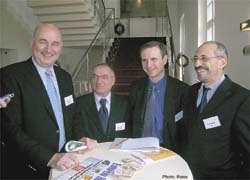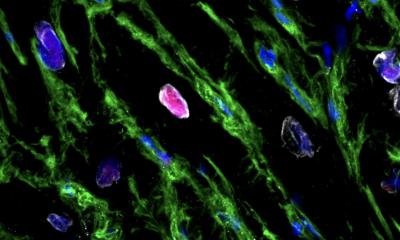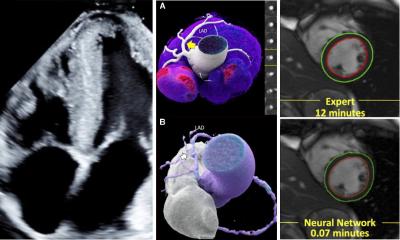Mechanical heart pumps could beat transplants
Almost one in three people over 55 will develop congestive heart failure, research has revealed. The Rotterdam Study, a prospective population-based study of cardiovascular and other diseases in the elderly, monitored 7,983 inhabitants of Ommoord, a Rotterdam suburb (source: Eur Heart J 2004: 25, 1614-19).

From left to right: R. Körfer, L. Arusoglu, P. Leprince and A. El-Banayosy
EH: The epidemiologic study has shown that five years after the first diagnosis of congestive heart failure, only 35% of patients were still alive. The median remaining lifetime was 2.1 years. How many extra years you can give them with a help device?
Leprince: Probably five. After that, we can change the device and gain a further five years. A modern device provides time to develop new strategies, e.g. stem cell therapy, or to replace the sick heart with a donor organ.
EH: Do you have already the ideal device to work for such a long time?
El-Banayosy: We are working on that. The new generation, magnetically levitated assist devices (see EUROPEAN HOSPITAL 5/2006 page 23) have run for 15 years in the laboratory. We have patients living well with these devices for two years. Now it must be proved that they will live five years and longer with them under normal circumstances.
EH: When you look at all these novel pumps, what are you still missing?
Leprince: We miss the experience of five years and longer in a significant number of cases. Furthermore, the quality of life should be improved. In the past, the industry has concentrated on developing safe and proper working pumps. Now the other components - batteries and controllers and cables - must become smaller and lighter.
EH: In your opinion, when will mechanical heart pumps better the results of heart transplantation?
El-Banayosy: Patients receiving a mechanical device are sicker than patients eligible for heart transplantation. In a few years, we will be able to implant such a pump earlier, then our patients will be on a par with those who have had organ transplantation. In the future, human hearts will be reserved for patients who will gain most from that therapy.
27.12.2006
More on the subject:





